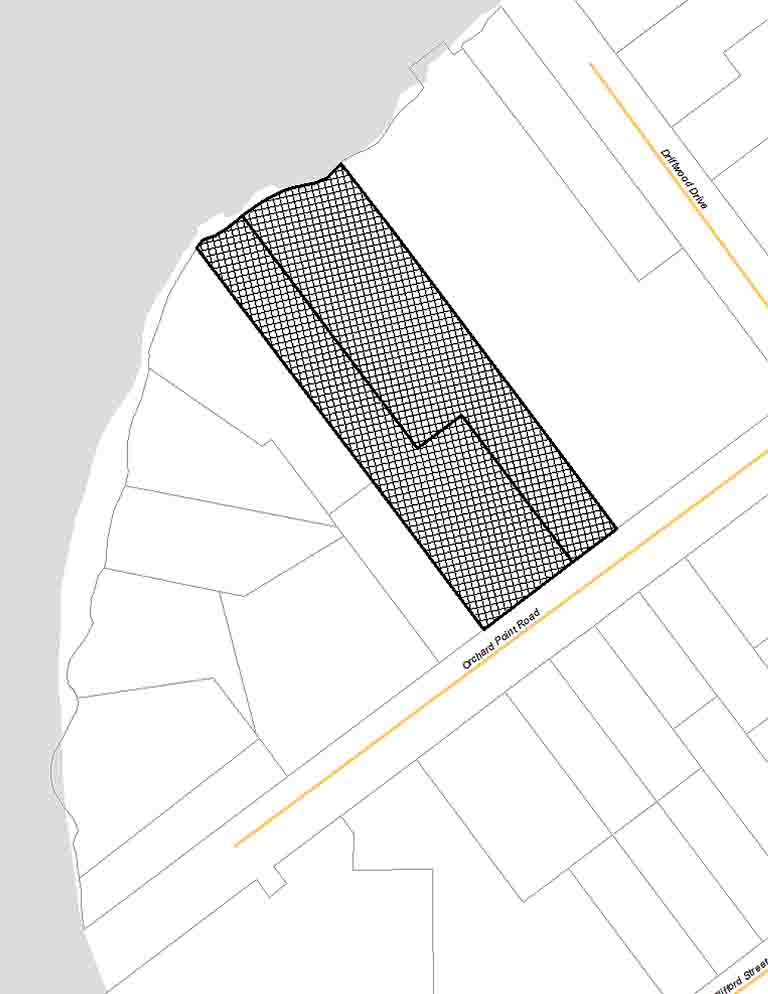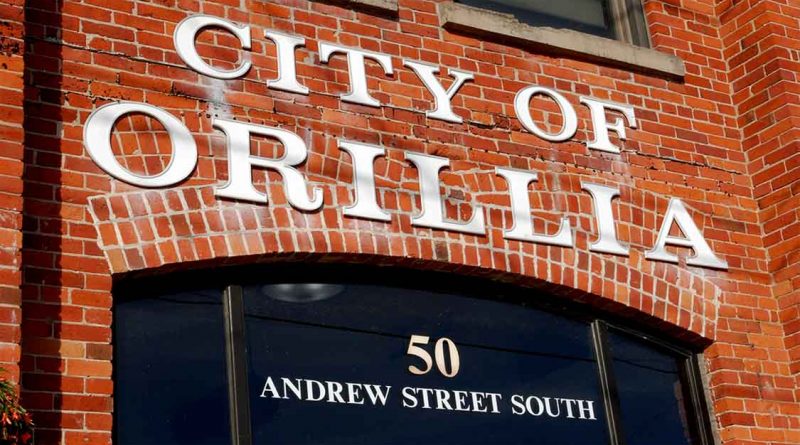Council Preview
By John Swartz
Orillia council’s regular meeting late this afternoon, following its 4 p.m. committee meeting, includes a motion to accept changes to a proposed by-law for a 21 home townhouse development at 39/41 Orchard Point Road by Sophie’s Landing Development Corp.
Wrapped up in the motion is a draft plan of subdivision, a draft plan of the controversial common elements condominium and zoning by-law amendments. Conditions for approval have been added to as a result of January’s public meeting.
A new provision requires the developer to do a well study and to keep tabs on the quality of neighbourhood wells, and replace them if damage occurs:

39/41 Orchard Point Road
“That a Private Well Impact Assessment shall be prepared by a Professional Engineer to the satisfaction of the City prior to Final Approval of the Plan of Subdivision. The Development Agreement with the City shall include provisions whereby the Owner shall be responsible for monitoring and replacement of any well-based individual lot water supply adversely affected in terms of water quality and/or quantity by the subject development. The Developer shall commission the undertaking of a further Well Survey and Monitoring Study not earlier than one year following the final completion of the last phase of development on the said lands. The Developer must also post securities with the City to ensure performance of their obligations. Securities will not be returned until the subsequent Well and Monitoring Study has been completed to the City’s satisfaction.”
Additionally, since the public meeting, the developer has made some changes and City staff are now recommending the zoning by-law for this property be amended from the 45% maximum lot coverage requirement, beyond the 63% the developer originally asked for, to 70%.
The by-law also requires 30% minimum landscaped open space, but the recommendation is for a reduction to 21%. It also requires a 2 meter fence, but staff are recommending 2.5 meters.
Show Us The Money
Another important item on the agenda is related to a letter from the Town of Midland sent to all municipalities asking for support on their proposal to the Canadian government regarding property taxes.
They would like to be able to waive all property taxes for 2020 on residences less than the assessed value of $500,000, 50% of taxes on residences beyond that up to $1 million, and 25% for properties over $1 million.
They would also like to the same ability for commercial, industrial and farm properties – 100% of value less than $10 million, 50% up to $50 million, and 25 % over $50 million.
To do this they want the federal government to make a transfer payment as a one-time grant to cover the lost tax revenue.
A sign of the times, Midland faxed their resolution to the government – and they also tweeted it to the prime minister. Councillor Ralph Cipolla pulled this item from a council information package to be discussed today. What is unusual is municipalities are governed by the province and it is the province that grants the right to tax properties. How the federal government gets a role in this matter is not clear.
For the first time in decades, there is only one item on the consent agenda and it is from the provincial government outlining the approval by the federal government of their share ($494,500) of an Investing in Canada Infrastructure Program grant to Orillia for transit improvements. The province’s share is $412,042. This is part and parcel of the funding announcement made by the premier in Orillia last August. The money will be used to build new transit shelters and install a payment system, cameras and bike racks on buses.
Committee Meeting
The 4 p.m. committee meeting features a report on councillor Jay Fallis’s request to have traffic calming measures for Emperor, Collegiate and Skyline Drives installed. Staff examined available data, tested current conditions and determined each road was short of requirements for installation of any measures and terminated their investigation. In each case the highest average speeds of 85% of vehicles recorded during testing were 53 KPH on Collegiate drive and the average speed of all vehicles on each road was less than the limit of 50 KPH.
Staff are recommending council not proceed, and outline if council chooses to go ahead the installation costs would be approximately $24,000 and approximately $19,000 annually for maintenance.
Council will also vote to host the 2022 Ontario Small Urban Municipality conference. This year’s conference, in Brant County, was cancelled and rescheduled to 2021 – the year Orillia was to host. OSUM asked if Orillia wanted to request the conference for 2022.
Generally these meetings are open to the public, but because of epidemic restrictions no one is allowed to attend. The meeting will be carried live on Rogers TV.
![]()







